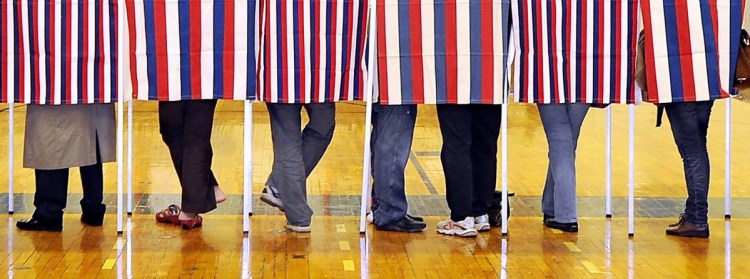The United States’ system of government has been a model for many new democracies.
We have exported our Constitution and our Bill of Rights. We have helped design governments with separate powers strong enough to check each other, and independent courts to enforce the rule of law.
But, so far, no one has wanted anything to do with our Electoral College, an 18th-century fix to a problem that no longer exists.
We, however, are stuck with it, and we should be very cautious about changing it, if we change it at all. Pushing a partial fix through Democratic-controlled state legislatures on party-line votes, as Maine lawmakers are now considering with L.D. 816, could actually make things worse.
We understand the Democrats’ frustration. With 48 states employing a winner-take-all approach and Maine and Nebraska using a winner-take-most system, it’s possible for the candidate with more votes to lose a presidential election if he or she doesn’t win enough states.
It has happened only five times in our 230-year history but twice already this century – two out of the last five presidential elections – both times giving the White House to a Republican who lost the popular vote. Minority rule could become the norm if population trends continue and Democratic voters remain clustered around a few big cities.
Reformers want to undo that possibility without amending the Constitution. The National Popular Vote Compact, already passed in 11 states, asks legislators to pass a law that commits that state’s Electoral College votes to the winner of the national popular vote. Once the votes from the states that have signed on to the compact total 270 – the number it takes to win a presidential election – it would become impossible for a popular-vote winner to lose the election. As long as one candidate receives at least one more vote than any of the others, he or she would instantly get a majority of electoral votes and win the White House.
That might work in a two-way race, but it could be a problem when there are multiple candidates, as Maine voters should be well aware.
Instead of competing with each other to persuade the same pool of voters, candidates in a four-way or five-way race could run up the vote in different regions or among different demographic groups, trying to cross the finish line first. A candidate who won only a state or two could end up with the most electoral votes and cash in through the popular-vote compact.
That’s not the only problem. Since the Republican Party has benefited from the Electoral College system in both the 2000 and 2016 elections, this has become a partisan issue. If a reform like this is pushed through by the Democrats acting alone, they would invite partisan blowback.
Democrats don’t have to look back very far in history to see what could happen. In 2013, frustrated Democrats blew up the filibuster, only to see it used against them when Republicans took power. The federal courts are now stocked from top to bottom with Trump appointees who did not have to cross a 60-vote threshold.
There are a number of things that the state and federal governments can and should do to increase election participation and make sure that everyone eligible to vote can vote. They include automatic voter registration, vote-by-mail and an Election Day holiday. Maine has led the nation as the first state to introduce ranked-choice voting, which should be extended this year to our presidential primary.
But defanging the Electoral College should be done only through a constitutional amendment that has bipartisan support.
Until that can happen, both parties should expect to play under the rules we’ve got.
Send questions/comments to the editors.



Success. Please wait for the page to reload. If the page does not reload within 5 seconds, please refresh the page.
Enter your email and password to access comments.
Hi, to comment on stories you must . This profile is in addition to your subscription and website login.
Already have a commenting profile? .
Invalid username/password.
Please check your email to confirm and complete your registration.
Only subscribers are eligible to post comments. Please subscribe or login first for digital access. Here’s why.
Use the form below to reset your password. When you've submitted your account email, we will send an email with a reset code.